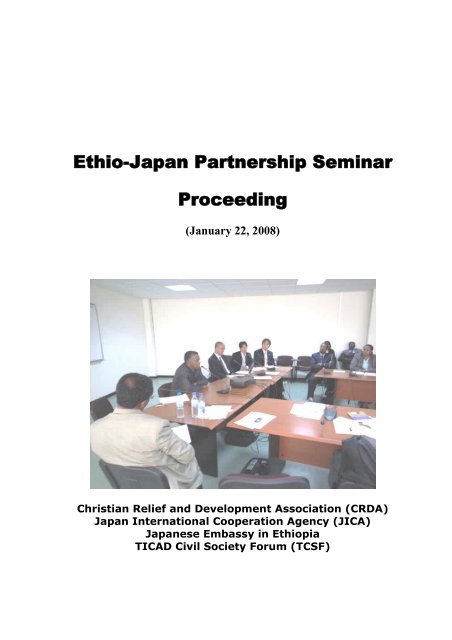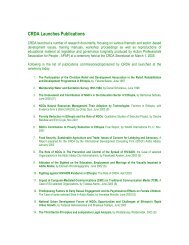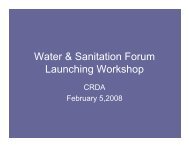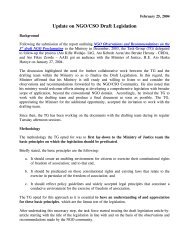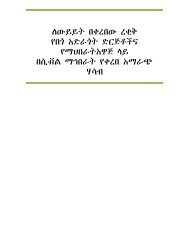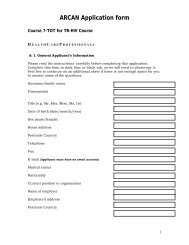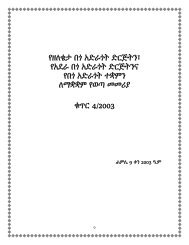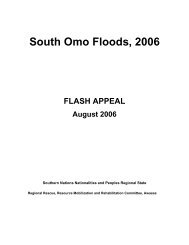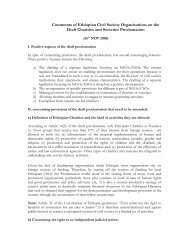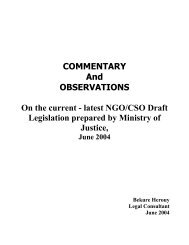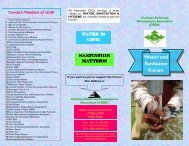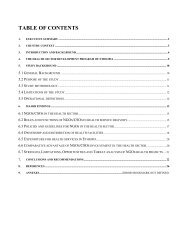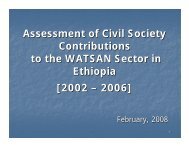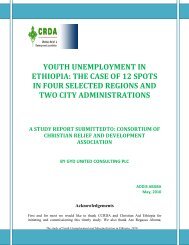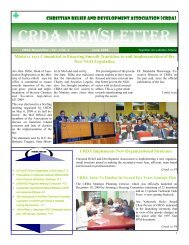Ethio-Japan Partnership Seminar Proceeding - CRDA Ethiopia
Ethio-Japan Partnership Seminar Proceeding - CRDA Ethiopia
Ethio-Japan Partnership Seminar Proceeding - CRDA Ethiopia
You also want an ePaper? Increase the reach of your titles
YUMPU automatically turns print PDFs into web optimized ePapers that Google loves.
<strong>Ethio</strong>-<strong>Japan</strong> <strong>Partnership</strong> <strong>Seminar</strong><strong>Proceeding</strong>(January 22, 2008)Christian Relief and Development Association (<strong>CRDA</strong>)<strong>Japan</strong> International Cooperation Agency (JICA)<strong>Japan</strong>ese Embassy in <strong>Ethio</strong>piaTICAD Civil Society Forum (TCSF)
Table of ContentsPage1. Introduction & Opening Remarks ……………………………………… 22. Presentations2.1. <strong>Japan</strong>’s ODA To Africa ……………………………………………. 22.2. <strong>Japan</strong>’s ODA In <strong>Ethio</strong>pia …………………………………………. 52.3. TICAD Civil Society Forum …………………………………..... 72.4. JICA And <strong>Japan</strong>ese ODA Projects To <strong>Ethio</strong>pia ………… 112.5. Civil Society In <strong>Ethio</strong>pia ………………………………………….. 133. Discussion, Concerns, Questions ………………………………………. 164. Afternoon Session ……………………………………………………………… 204.1. Briefing on the ODI Study ……………………………………… 204.2. Introduction - Group Discussion. ………………………….. 204.3. Group Discussion Presentations ……………………………..4.3.1. Group I – Accelerating Economic Growth 224.3.2. Group II – Human Security ………………….. 244.3.3. Group III – Environmental DegradationClimate Change…………………………………….. 274.4. Discussions, Comments And Questions …………………… 285. Concluding Remarks………………………………………………………………….. 306. Annex6.1. List of Participants6.2. Workshop Program6.3. Voices of <strong>Ethio</strong>pian and <strong>Japan</strong>ese Civil Society towards TICAD IV6.4. Letter to Mr. Mori, Former Prim Minister of <strong>Japan</strong>1
January 22, 2008<strong>CRDA</strong> Conference Hall<strong>Ethio</strong>-<strong>Japan</strong> <strong>Partnership</strong> <strong>Seminar</strong>Participants began to arrive at 8:30 a.m. and registration followed through 9:00.Introduction & Opening remarksThe seminar began at 9:00 with warm greetings & welcome by the NGO-JICA<strong>Japan</strong> Desk Coordinator in <strong>CRDA</strong> Wz. Tsehay and she called upon Wz. SemiraActing Head of the <strong>CRDA</strong>. She made an opening remark with warm welcoming.In her speech she addressed the participants that this meeting is a continuationof the last year seminar, which will create an opportunity to create favourableconditions to strengthen the partnership of <strong>Ethio</strong>pian civil society and <strong>Japan</strong>government. She expressed her hope that this seminar will produce moreproductive points towards creating a more objective and meaningful results thatthe <strong>Japan</strong>ese government will give due consideration for its future plan.Wz. Tsehay then called upon the seminar facilitator Mr. Million Alemayehu. Mr.Million introduced himself briefly to the audience and invited the <strong>Japan</strong>eseEmbassy representative, Head of Economic cooperation Mr. Omoto todeliver his presentation.PresentationsI. <strong>Japan</strong>’s ODA to AfricaMr. Omoto began his discussion with the overview of historic emergence ofTICAD, which emphasize on importance of “Africa’s ownership”, “partnership”.TICAD, Tokyo International Conference on Africa Development, is a globalframework for Asia and Africa to collaborate in promoting Africa’s developmentand evoker for the attention of international society towards Africa. TICAD is cohostedby UN and <strong>Japan</strong>ese government. In the presentation it was mentionedthat the third conference, TICAD III (Sep. 2003) reviewed the ten years2
achievements and for the first time discussed the “New partnership for Africa”.He also discussed the basic concept of TICAD, i.e. “Towards a Vibrant Africa: AContinent of Hope and Opportunity”. The three priority area of TICAD IV, May28-30, 2008 were introduced: Boosting economic Growth in Africa - i.e. selfsustained projects, trade, investment, infrastructure etc., Ensuring “HumanSecurity” that includes MDG - Consolidation of Peace and Democratization,Addressing Environmental issues and Climate change in which Mr. Omotomentioned a bottleneck to development efforts and Africa is the most vulnerablecontinent.The following were shared as cross-cutting elements: Enhancing coordinationwith AU/NEPAD, RECs, other donors like China and India, use of Asia’sexperience, Human resource development (basic to any developing countries),Diversity among African countries (need of country specific approaches),Support to improve governance and rule of law (not only political but alsoeconomic), collaboration with the private and civil society organizations (withoutwhich sustained economic development can’t happen). Schedule leading toTICAD IV were also shared.Mr. Omoto further shared briefly about the main themes of G8 Hokkaido ToyakoSummit, July 7-9 2008, as; Development and Africa, Environment and ClimateChange, World Economy, Political Issues including Non-proliferation. The theme“Development and Africa” was further discussed that by reviewing theachievements thus far it will focus on sending a message toward achieving theMillennium Development Goals (MDGs) by 2015 and discussion will build on theoutcome of the Fourth Tokyo International Conference on African Development(TICAD IV)He further presented the <strong>Japan</strong>’s ODA to <strong>Ethio</strong>pia, Country assistance to <strong>Ethio</strong>pia,that he mentioned it was ‘practically introduced last year’. The CountryAssistance to <strong>Ethio</strong>pia focuses on; policy framework (guiding principle of <strong>Japan</strong>’sassistance in the medium-term, about five years), Establishing rationale forassistance to <strong>Ethio</strong>pia (section of development agenda with strategic approach),3
Policy alignment to PASDEP (which was presented to the <strong>Ethio</strong>pian Governmentand approved for its alignment with PASDEP). <strong>Japan</strong>’s major objective ofassistance focuses on overcoming poverty through consolidation of food securityenhancing food productivity and food purchasing power of <strong>Ethio</strong>pian people andimproving food access through the market, which are believed to be thegateway for <strong>Ethio</strong>pia’s sustainable economic growth. Referring the abovementioned major objective he acknowledged the good weather and foodproduction for the past 3-4 years. It was also mentioned that the currentmarketing system of the country is not well organized that definitely will affectsustainable development.The following five priority sectors in <strong>Japan</strong>’s ODA’s to <strong>Ethio</strong>pia were alsodiscussed: Agriculture/rural development, Water resource, Socio-economicinfrastructure, Education and Health. All these were shared by Mr. Omoto asimportant to the achievement of the MDGs and Human Security. As long termdevelopment strategy two focus areas were mentioned in the presentation: a)non-agricultural income and urban industry (privet sector) - promotion oflarge industry to get international market, and b) conduct effect researchand analyses to help: Further development of economic infrastructures Utilization of natural resources Promotion of small and medium-sized enterpriseWith this Mr. Omoto concluded his presentation passing his appreciation for theattention given.The facilitator thanked Mr. Omoto for the very informative presentation andcalled upon the second presenter Mr. Masuda, the second secretary to the<strong>Japan</strong> Embassy.Mr Masuda briefly introduced himself and the lady who is in charge of smallgrants in <strong>Japan</strong>ese embassy.4
II. <strong>Japan</strong>'s ODA in <strong>Ethio</strong>piaSecond secretary to the <strong>Japan</strong> Embassy, Mr. Masuda, made a brief presentationon the <strong>Japan</strong>ese ODA Program to <strong>Ethio</strong>pia. In his presentation, he elaboratedthe two ways the <strong>Japan</strong>ese government offers assistance, which are a Bilateralassistance and through International Organization like the United Nations andthe World bank. In the Bilateral Assistance Program, in which his area ofpresentation addresses, there are Grants that are delivered to assistdevelopment activities in <strong>Ethio</strong>pia through a program designed as EconomicDevelopment Assistance that include grant aid for general projects, structuraladjustment support, emergency aid, <strong>Japan</strong>ese NGO projects, and for grass rootsand human security projects. As part of the Grants, the Technical Cooperation,which is part of the Grants, focuses on the Training Programs, dispatch oftechnical experts, making development surveys, <strong>Japan</strong>ese Overseas CooperationProgram, and senior Overseas Volunteers Program. In the aid it delivers throughInternational organization, it offers loans, to which the <strong>Ethio</strong>pian Government isnot currently entitled to it.He further explained on the many activities that the <strong>Japan</strong>ese government iscurrently involved which includes the New Abay Bridge Construction, which isexpected to be completed at the end of August 2008, whose opening ceremonywill coincide with the end of the <strong>Ethio</strong>pian Millennium. Further describing theactivities of <strong>Japan</strong>ese Implementation Cooperative Agency (JICA), which focuseson rural infrastructure and water supply project, he outlined the regions andareas like Afar and Tigray where economic cooperation activities in <strong>Ethio</strong>pia iscurrently underway, and five main priority sectors in which different projects arebeing carried on, and these are: Agricultural, Education, Water Supply, Healthsector, and Infrastructure projects.In his deliberation, Mr. Masuda further elaborated on the works targeting onhuman resource development, which targets on developing skilled manpower –technicians and mechanics. It was also disclosed that there is a required need ofhuman resources, which is numbered to 49,176. The need for strengthening5
partnership with civil society was underlined by Mr. Masuda. As per hisexplanation, he said, one way is through international organization, where <strong>Japan</strong>Social Development Fund (JSDF), is channeled through the World Bank, which isgranted to support pastoral community. The amount of funding for thisparticular activity was 1,877,660 USD in 2004. This was arranged to support acapacity building process aimed at facilitating direct and demand-driveninvestment to poor and vulnerable pastoralist communities in the lowland of<strong>Ethio</strong>pia. Explaining on Bilateral assistance, he mentioned the two type of grantassistance available and these are aids for grassroots and human securityprojects, and general projects, which are categorized under time and costframeworks.For projects that take few years and more than 880,000 USD, which requiresexchange of notes with the government of <strong>Japan</strong> are categorized under GrantAid for General Projects. Those grass root grants that require few weeks ormonths, grant contract with the Embassy of <strong>Japan</strong> in <strong>Ethio</strong>pia, and costs lessthan 88,000 USD are categorized under the Grant Assistance for Grassroots andHuman Security projects, according to Mr. Masuda from the view point of BasicHuman Needs and Human Security, he said, priority sectors were identified.These are Agriculture (irrigation), Water Supply (Digging Wells), PrimaryEducation (school construction), Basic Medical care (Health Post Construction),etc. To make the Grant assistance for Grassroots more strategic, the synergismof value added approach projects, collaboration with other related projects, postconflict areas where there is no other related project, new issues beyond thecountry assistant plan, civic problems, environmental problems, etc. werediscussed.On conclusion, he said, there are 25 projects in 40 components assisted in 2007.These components are one on governance, one on infrastructure, two onbusiness, two on environment, three on agriculture, nine on water, nine onhealth and thirteen on education. He asked the participants to submit anyproposal filling the form, which he was already distributed, to the <strong>Japan</strong>6
Embassy in <strong>Ethio</strong>pia for further consideration.He finally concluded his speechby saying, “We have enough room to work together with you, civil societies.”Presentation and DiscussionIII. JICA and <strong>Japan</strong>ese ODA Projects to <strong>Ethio</strong>piaPresenter Mr. Nakamura - Residence Representative of JICAJICA is primarily engaged in agricultural and rural development projects inselected target areas in Oromiya Region. Basically we are in charge of capacitybuilding through technical cooperation, he said. Our beneficiaries are farmers,and we dispatched 20-30 <strong>Japan</strong>ese experts to transfer our technology. Heexplained two major projects that are currently underway, One Village OneProduct Project, and Participatory Forest Management Project, which areestablished in the Oromiya regions.The objective of this project is to create awareness to the farmers on how tomake value added product. Meaning, “do not sell banana, just as banana, butadd some kind of value to it, may be like a banana jam or banana candy”, sothat such practices can attract more market from buyers. This project wasinitially initiated in 1979 in <strong>Japan</strong> rural areas and had huge impact in thoseareas, and then spread to Taiwan, Philippines, Mongolia, and then to Africa in7
Malawi and <strong>Ethio</strong>pia too. In addition to attracting market and more income tothe farmer, this serves as community empowerment tool so that it will enhanceconfidence and help in setting good mind set within the community, as hedisclosed. Further to this, he said, this project was introduced in the FarmersFestivals in Awassa town, which was organized by the <strong>Ethio</strong>pian government 10days ago. In this display a paper craft made from banana tree, a well-packagedseed made by the research institute and other products were introduced.The participatory Forest Management Project deals with consensus of buildingamong forest users, in which sustainable forest management is carried out insustainable manner by the local people in Belete-Gera RFPA as he mentioned.Among few activities carried out in this project are, guideline, extension strategy,capacity building on local people, and other major works that improve thelivelihood of farmers have been performed. In improving the livelihood of thefarmer, the project facilitates in obtaining certification of coffee productivity soas to help the farmers obtain 25% premium incentives, and promotes exportersto buy those quality products from the farmers. The Beleta Gera projectsperformed three major tasks, which includes preparing easy documents ormanuals that help as guide lines, introduction of livelihood of the farmers thruobtaining certificate of coffee productivity, and agro forestry productivityfarmers field school, and cover all part of the populations of the village in theBelete Gera so as to avoid conflict that may arise due to such selection andseparation.In his brief intro speech, the program coordinator of the project to the areadelivered introduction about the progress and activities JICA was carrying out inthe area. He said JICA is highly effective and helpful to the farmers and to thearea. It is a matter of knowledge to us that the 2% left over of the forest of thecountry is found only there, as we all know as he commented. And then heforwarded the session to the beneficiaries of the Project, delegated two farmersthat came to attend the seminar. A farmer named, Hussein Abdi, presented aspeech representing WaBUB farmers association, in Sebuke Debuye kebele. Thename WaBUB signifies ‘Forest Management Association’. He reported on the8
activities the farmers were carrying out in his area. According to Hussein,WaBUB was established in 1996 E.C. with the help and coordination of thefarmers residing in the area, representative of government offices in theirrespective area, which was comprised of Woreda agriculture and administrationOffices. This is a project that makes the farmer live with the forest, as Husseinmentioned, and helps every one who lives there. They function by organizingcommittees who follow up and monitors on the activities bi-annually and reportstop the respective government offices whether there was any damage occurredin the forest. This is fully done with full willingness and awareness of the farmers,he added. We were around 56 farmers when originally established, but now wereached to 158, he said. Another farmer who attended the seminar said JICAhad made a lot of contribution to the farmers there. JICA made water availableto the farmers, which were time and labor consuming to find and have watereasily before. JICA has constructed warehouses for storing coffee products so asto help the farmer use in a way they need it.Questions and Comments forwarded to the three speakers:Q1. What is the level of participation and partnership of civil society inthe programs of TICAD since its establishment in 1993?Unfortunately civil society is not participating officially, and the government of<strong>Japan</strong> is trying to obtain comments from civil society with having consecutivemeetings in the future.Q2. Why is JSDF is channeled through the World Bank to assist thepastoralists in <strong>Ethio</strong>pia, instead of directly channeling through civilsociety or any other concerned party who is directly responsible forsuch program here in <strong>Ethio</strong>pia?This is a different approach, in which the <strong>Japan</strong>ese government earmarked fundsto the World Bank so as to assist the pastoralist, and the selection in the fundingprocess goes to the World Bank, which has its own rules and regulation with thisregard. I think the World Bank in Washington Office contacted the World Bank9
Addis office, and that fund is channeled in such was so as to help thepastoralists here.Q3. Does TICAD support especial groups of society like women,children, youth and the like?TICAD is not initially designed to implement activities for especial groupsmentioned, but as part of the society those mentioned groups are directly andindirectly beneficiaries of the projects activated by TICAD.Q4. How is the youth population mentioned and raised as challenge byyour government?Compared to China that has huge population, the youth population ration is notthat much as taking into account the cases in Africa, where Africa has hugeyouth population, which is not that productive, and becomes threat to theeconomic growth, and issue for economic projects due to unemployment andother related issues connected to this.Q5. What is your initiative regarding exploring minerals/naturalresources for this is important for sustainable development? What isyour contribution regarding improving technological capacity with thisregard?<strong>Japan</strong>’s resource is limited, and we are forced to support on focusing prioritysectors so that much can be done with that by concentrating on specific sectorsand having set priorities.We believe that we should transfer technological capacity and knowledge whoseorigin is of <strong>Japan</strong> to here, and we are doing this through our technicalassistances, sharing basic ideas.Q6. Do you cover costs for maintenance of roads construction?The intention of funding projects is not to make the civil society entirelydependent up on us, but rather we want to see the sense of ownership by thecivil societies and those beneficiaries in a way becoming self-sustainable and10
self-sufficient. And thus we do not cover the maintenance costs after thecompletion of the constructions.Q7. Do you have strategies to strengthen your partnership with thecivil society?We are now trying to strengthen our relationship by arranging particularmeetings like this one, and will do the same in the future.Q8. What is your opinion regarding the efficiency of civil society in<strong>Ethio</strong>pia?Generally speaking, it is nice and it is very active. Nevertheless, there is alwaysenough room to improve and work together.Presentation continuedIV. TICAD CIVIL SOCIETY FORUMPresenter Mr. Kiyoshi Shiratori - Board member of the ForumMr. Shiratori commenced his speech by explaining the nature and character ofTCSF. TCSF is a registered non-profit organization established in June 2004 in<strong>Japan</strong>, with the aim of making <strong>Japan</strong>’s ODA to have effective impact on theneeds of grassroots people in Africa through providing forum to discuss issueson African development program among various stakeholders. It has about 100members, who are researchers, practitioners, students, ordinary citizensinterested in <strong>Japan</strong>’s ODA and or African development. TCSF also networks with<strong>Japan</strong> NGO in Tokyo, African diplomats in Tokyo, and civil commissionsrepresenting NGOs by 20 African countries.To make realize <strong>Japan</strong>’s ODA of more people centered, TCSF has been carryingout several activities, out of which is to compile and publish white paper on<strong>Japan</strong>’s Africa Policy since 2005, and so far two issues have been published, hesaid. Of the activities TCSF involved, advocacy is one of them, which aim atpoverty reduction, supportive of development by African people, channeling11
esources directly to grassroots level, achieving commitment of <strong>Japan</strong>esegovernment to the ODA. He also mentioned that it is necessary that civil societyshould be an equal partner of TICAD so that it could be a forum where people ofAfrica and <strong>Japan</strong> discuss what the future has uphold for both.TICAD also serves as voices of African and <strong>Japan</strong>ese civil society, whosedeliberation in October 2007, in its meeting held in <strong>Japan</strong>, Tokyo, voicedcommon genuine concern of African, <strong>Japan</strong>ese, and other Asian civil society, andpresented concrete suggestions and actionable recommendations to the TokyoInternational Conference on African development (TICAD). These are thefollowing: People centered; ownership and bottom-up approaches Community empowerment for sustainable impact Capacity enhancement for government and CSOs Involvement of CSOs throughout TICAD as equal partners.He further mentioned the three major voices of the civil society in which TICADserves as mouthpieces, and these are on Investment and economicdevelopment, human security and environment and climate change issues.Acknowledging the positive economic growth Africa is experiencing, in which fewcountries recorded 5% economic growth and others like <strong>Ethio</strong>pia did 10%economic growth, that now makes the continent a viable investment destination,and is an indicator that development efforts are bearing fruit on the continent,he said.He further briefed the recommendations that TICAD has identified three majorvoices outlined to achieve human dignity and satisfy basic human rights in thecontinent, which will be dispatched to Gabon Ministerial Conference on TICAD inMarch 2008, publish white paper in March 2008, and civil society symposium inMay 2008. Basic documents that outline and explain the activities andpreambles of TICAD was distributed to the participants for their further studyand comments they may have and be forwarded to the TICAD representative,12
which he asked the participants to forward comments and suggestion they haveon TICAD to him after the meeting and contacting directly to his office.V. Civil Society in <strong>Ethio</strong>piaMr. Gizaw From Gudina Tumsa Foundation representing <strong>Ethio</strong>pian NGOsMr. Gizaw began his presentation sharing the general outline for his discussion.In his sharing of the background information about the Gudina TumsaFoundation, he said that the foundation was established in the early 90s to carryon the vision of Rev. Gudina Tumsa who was assassinated in 1979 by theMarxist military regime of <strong>Ethio</strong>pia. Since the time of its establishment thefoundation mainly focused on securing the livelihood of marginalized anddisadvantaged communities, especially the Karayu pastoralists. In thepresentation there were pictures of the Karayu people demonstrating their everyday life and it mentioned that this people are almost completely overlooked bycontemporary development. Until recent days the Karayu people were selfsufficient. However, nowadays their life style is more & more endangered asthere are more resettlements & industrialization, which are destroying their life.In the discussion, the following were shared as areas of interventions in the landof Karayu; education, Inte-Pastorialists Community Capacity Building, GudinaTumsa and His Legacy, Publication of Oromo Wisdom Literatures, grated NaturalResource Management, Livestock Development, Improving Livelihood, andWomen’s Promotion.The education line of intervention has two major path, i.e. formal - both tochildren and adults, and non-formal - functional literacy and adult skill trainings.Pictures of the First School in the Karayu Land of Fantalle: “ Dandi GudinaPrimary School” and various activities in relation to school was shared. Theprimary school has a school feeding program too. In the presentation it wasnoted that some women organized themselves into groups and asked to begiven literacy and numeric lessons together. And the foundation is now givingfunctional literacy training and the program is supported with exchange of13
experience through exchange visits to Borana where similar projects are beingimplemented. Elaborations to the intervention areas were given with the help ofpictures shared.Under the section of Environment protection and rehabilitation, Mr. Gizawshared that in order to minimize adverse effects and maximize benefits in thearid Karayu land all GTF’s projects considers grassroots knowledge and EIA asessential component. At this point he also mentioned his concern that ODA in itsfunding support doesn’t address, as criteria, the EIA which is the majorcomponent for environment protection. Continuing his presentation on‘environment’ he shared the following activities which GTF has spearheaded inthe area of Karayu:• GTF is the first NGO that has successful nursery site in the land of Karayu.• GTF is the first successful NGO thus far to distributes seedlings and followtheir status on the land of Karayu.• GTF is successful in preparing drought resistant & Multi – purposeseedlingsPictures of nursery sights, seedlings and afforestration - trees in the desert werealso presented to elaborate the above explanations.He further shared the foundation’s experience in using the Grassroots Grantfund from the <strong>Japan</strong>ese government. In doing so the following were presented:Projects financed by Africa Rikai & <strong>Japan</strong> embassy• Establishment of pedagogical & environmental center• Enhancing girls education ( sponsorship support for girls)• Essay competition among pastoralist Karayu students• Construction of additional classrooms & provision of furniture,• Construction & provision of furniture for laboratory• Construction and provision of furniture for library• With these & other projects GTF benefited more than 1,156,878 pastoralpeople in the Karayu community14
In addition, Christian Aid-UK, Oxfam-Canada, Alberta-Rotary West Lock, Breadfor the World-Germany, and Rainbow for the future were mentioned as majorbenefactors. Mr. Gizaw in the presentation also shared the points he elaboratedas “The pros and ‘cons’ of Grassroots Grants’ accordingly the following pointswere listed as pros:Pros:• Accessible & Welcoming to work with• Willing to go to the remote land of Karayu• Willing to support the construction of infrastructures, (school) which otherbenefactors usually refuse• Willing to support the education sector, which others consider as the dutyof government• Appreciates our people–centered approach & marginalized communityempowerment• Accountable to their promises• Timely release of fund along with project monitoring and evaluationCons:• Fail to cover administrative, VAT, & similar costs• Not–flexible [fail to consider changes due to time such as marketfluctuations]• Does not require EIA• Project life span should be greater than one yearThe presentation further deliberated on the problems encountered by thefoundation during the implementation of its activity. Most of the problem areasare mention to be experienced in relation with the local government or linegovernment offices:• Failure to see the possibility of win –win b/n environment and investment• Limited capacity to implement the available laws, policies, and regulations(e.g.: EIA for projects)• Focus only on daily bread (e.g. real estates around & in A.A, and peopleevicted due to projects)15
• Failure to inflict budget meant for EIA in projects• Focus only on the economic growth, not impacts on the environment• Sometimes consider the efforts of NGOs/CSOs as if we are againstdevelopment• Limited knowledge of sustainable development (line offices)• Limited time to hear NGOs/CSOs (line offices)• Long and boring bureaucracy• Government staff turnover• Fear of unknowns, ‘people could ask their rights’ including EconomicJustice• Pollution in beyond the level of description (we lost one lake and we hopeto lose one very soon)• Lack of considering local knowledge• Line offices fail to see that we are their to fill gaps in development• Budgetary constraints for some of our projects (beneficiaries beyondexpected number)Finally Mr. Gizaw concluded his presentation by sharing a slid note in title:“OUR MESSAGE TO JAPANESE NGOs” and the message contained the followingstatement; …in the challenge to challenge the challenges of poverty andenvironmental deterioration, transfer knowledge, skill, direct aid andexperience based on the vision and interest of the marginalized &disadvantaged people living on the other side of the globe.DISCUSSION, CONCERNS, QUESTIONSQ1. The share of funds of the <strong>Japan</strong>ese government is smaller whencompared to that of the United States and Europe. Is there anypossibility that this share can be increased?More collaboration with local NGOs is needed as there is low participation, andwe did not have long history with this respect like the US and EU. JICA isorganizing training, and working with NGOs, and started the journey. 1516
epresentatives of <strong>Japan</strong>ese NGOs are studying the relationship and thecondition here and will forward their comments to the Head Quarter in <strong>Japan</strong>.Q2. <strong>Japan</strong> is the producer of millions of cars and I think they haveenough second hand cars to give away. Is there any thing the <strong>Japan</strong>government can do with this regard to us so that we receive secondhand cars from you?Q3. Irregardless of environmental consequences it entails, there is aneed to build housed in the rural areas, though this do have an adverseeffect on the climate?Clear misunderstanding on what the explanation was all about, Ato Gizawcommented. He said he was talking about those 6-7 storey buildings that tookthe life of many eucalyptus tress, which obviously have adverse effect on theenvironment.Q4. Does JICA have any plan with the civil society?We should consider improving relationship with the civil society. Civil societiescan propose their ideas to the Office, so that we can discuss them. Moreover,this kind of seminar is one of the chances to improve our relationship.Q5. Projects by their very nature are time bound, unlike the <strong>Japan</strong>Embassy’s consideration that is based on funding with time bound andbudget sealing. How do you reconcile such aspects? The <strong>Japan</strong>ese aremore rigid, which inhibit us from performing our activities in a way weneed. Can you be a little bit flexible?Small grant donors will be benefited from such experiences, and with this regardvery fast step goes to the beneficiaries. With regard to the budget sealing, themaximum budget goes to 880,000USD, which requires approval from the <strong>Japan</strong>government, which is difficult to get approval from the head quarter in <strong>Japan</strong>.17
Regarding time limit, we can do extension if there is a need for that. As said, weare rigid, which is true. In the mean time we are considering the possibilities ofholding budget contingencies for the first general grant, not for grass root grant,and we are currently working on this matter. In fact things are improving withthe <strong>Japan</strong>ese government with relation to TICAD, though large portion of policyis made without consulting civil societies. But as it is there are lot of ideas andpossibilities.Q6. I had been to <strong>Japan</strong> for visit, and learnt and gained greatexperience from the expertise and as matter of my stay there. In mystay there I learnt that JICA send volunteers to share technicalexperiences and knowledge to countries like Nepal, and few Africancountries. Is there any plan JICA has for sending volunteers who canshare technical expertise to the civil societies here? Is there any chanceto human resource development, in which civil societies be offeredtraining in Asian countries?With regard to human resource development, thru the implementation of smallscale projects, we hope that civil society could be helped.Q7. Being happy to find environmental friendly and professionalperson in the kereyu area, is your organization interested in the scarceresource-wild life? How is the relationship between the wildlife and thepeople in relation to the natural resources?We have 20 local species of plants, both exotic and indigenous types, andprepare and distribute them to the local people. And the survival rate of theindigenous species is like 30% and that of the exotic species is 10-15%.Nothing significant has been done with regard to the wild life, and there is acontroversy in those areas, and they could not go beyond further, and haveconstraints.Q8. Are the farmers who reside in your areas displaced due to theimplementation of this project? Is the life of the farmers taken care of?18
The project was originally commenced with the involvements and knowledge offthe farmers themselves. The farmers are well aware of what is going on, whenthey were organized in this project. And we know and understood that it was forour own benefit. The farmers live amid forests and plants, and produce coffeeand help their livelihood. We were not and do not feel that we were deceived orcheated. And we are seeing that we are getting benefit out of it.Q9. Does JICA take into account local knowledge and bylaws of thelocal people?In our past experiences, those areas were not fully considered. Now, weunderstand their importance in our project planning and implementation. That'swhy the Belete-Gera participatory forest management project is currentlyfocusing on local knowledge as well as bylaws to strengthen local institutions forsustainable forest management.The morning session was concluded at 12:45 with the announcement made byWz. Tsehay reminding the continuation of the program in the afternoon withthose who received the invitation for the session. Lunch was served at <strong>CRDA</strong>restaurant.19
Afternoon SessionMr. Shiratori welcomed the participants of the afternoon session and he briefedabout the program to the afternoon session. The afternoon session wasdedicated basically for group discussion. Before the group discussion began Mr.Shiratori called up on Ms. Kulwuha Tesfaye, to make brief presentation of herstudy on <strong>Japan</strong>ese Aid effectiveness in <strong>Ethio</strong>pia.OUTLINE to ODI STUDY on JAPANESE AID EFFECTIVENESS in ETHIOPIAPresenter: Ms. Kulwuha TesfayeMs. Kulwuha presented a brief outline of the ODI funded study on <strong>Japan</strong>ese AidEffectiveness, in which her organization. She described that the organization isconducting a research in five countries taking part in the study, Ghana,Bangladesh, Malawi, Vietnam and Zambia. The study uses evidence basedapproach with the context of <strong>Ethio</strong>pian government policy, and aims atgenerating and synthesizing research based evidence on <strong>Japan</strong>ese assistancefrom the six plot countries with a view to influencing pro-poor policies, and theissues that are being dealt with are compliance with the Paris Declaration on AidEffectiveness, thus assessing the extent to which <strong>Japan</strong>ese Aid supportsprinciples of mutual interest and accountability. The research will center aroundon <strong>Japan</strong>’s development approach and priority sector in <strong>Ethio</strong>pia, whether theseare in alignment with the priority areas set by the Government of <strong>Ethio</strong>pia, onmutual interest and accountability, through identifying who the stakeholders areand how they are involved. The study will be finalized towards mid February,and will be sharing the findings with all stakeholders involved, she concluded.Introduction to the Group Discussion by Mr Shiratori,The afternoon session began at 1:40 p.m. Mr. Shiratori, the facilitator for theafternoon session briefed participants about the session. As also indicated in theschedule the afternoon was dedicated for group discussion. The group discussionwas advised to pursue the following three discussion points in addressing theissues in their respective group;20
What are the issues of grassroots people?What can civil society do for the issues?How <strong>Japan</strong>ese ODA can facilitate the above efforts?The grouping was organized into three in line with the three themes that arepillars of TICAD IV.1. Accelerating economic developmentIs economic growth, in <strong>Ethio</strong>pian case, pro-poor?Private led investment and ODAInternational trade, opportunity for <strong>Ethio</strong>pia and poverty reductionMore technical cooperation for economic development?Group Work2. Human security2.1. MDGsMDG 1-8 (eradicate extreme poverty and hunger, universal primaryeducation, gender equality and empower women, child mortality,maternal health, HIV/AIDS, malaria and other diseases, environmentalsustainability, and partnership for developmentRight based approach21
Role of government and civil society (including non-NGO partners)Consideration on gender, minority, disabled, elders, etc.2.2. Peace consolidation and good democratizationSupport to think tank/advocacy NGOsRefugees and returnees3. Environment degradation and climate changes Environment and development/investment, natural resourcemanagement and livelihood Pastoralist and development EIA in development GMO, bio-fuel, natural resource exploitationCross cutting issues in terms of partnership between ODA and civil societyOwnership (whose?), priority (whose?), accountability (to whom?)Holistic approach, linkage, partnership, programme approachPeople centered, poverty reductionParticipation of civil societyFlexibility of the assistance programmeHow to establish regular communication between <strong>Japan</strong>ese ODA and civilsocietyGroup Discussion presentationsGroup One - Accelerating Economic Growth1. Issues raised/to be considered in future activities: Every project and activity should start with need assessment, i.e.based on community need Projects should consider both the Rural and Urban poor; mostly theurban poor are overlooked.22
Projects must be designed in such a way that products arediversified and market oriented Strengthening partnership with line government sectors Introduce microfinance & Income Generating Activities to improvethe situation at house hold level. Consider providing seed money Work on attitudinal change through capacity building because mostof our problems are emanated from attitude problem Assess impact and learning from past experiences Consider to improve the life span of projects2. to address the issues try to build close partnership with the governmentsectors3. <strong>Japan</strong>ese embassy, ODA and JICA Consider the issues for funding Closely work with CSOs4. Recommendation Establishment of forum that will help to make networking between Develop flexibility in your side - extending the project cycle andamount of grant Move from project based to programs Include technical cooperationComments from the participants on group one presentationi. One participant seriously stressed and commented that extending theproject cycle without a corresponding adjustment of grant for theimplied administrative cost will create rather complication than asolution.23
Group Two - Human SecurityThe issue of human security should consider the need of economic growth,investment and environment protection. Further to this it includes dignity and itis people centered. The group understands that human security is all abouteconomic, political, social and cultural rights of the society and also respect for;gender balance, minority, disabled and children i.e. the marginalized ones in thesociety. Therefore, MDG can be achieved only if human security is realized.Group PresentationThe group presenter following this introduction presented the group’s discussionoutcomes as follows:MDGWhat are the issues of the grassroots people? All MDGs are the issues of the grassroots All goals are interrelated and interdependent, To meet the enumerated goals the capacity of all partners shouldbe developed, i.e. Government, NGOs, and CBOs• As to how to develop the capacity could be addressedthrough financial support, infrastructure, technical support,and provision of human resource.24
The role of Civil Society Civil society should be strong - be on its own Work for the creation of assertive society, a society that can speakout its need. Empowerment of the people to ask for their right, Civil society must educate the society that the MDGs are notprivileges rather their rights and encourage ask for it. (Right basedapproach) Educate and empower the community on how to monitor theaccountability of the government towards the realization of MDGs. Should work for the capacity of the government at all levels. Should empower the people (teach) about budget tracking at aworeda level. CSOs should also focus on sustainable development using the localknowledge.Right Based ApproachIssues: Lack of knowledge about right issues among the community People did not know that MDGs are rights not privileges and thecommunity have the right to participate in the implementation.CSOs: what should be done? Teach the community that all MDGs are the social/economic andcultural rights of the people. Create awareness about RBA Participation of community in the policy making Educate the people about the their right CSO should also be accountable to the people where they interveneRole of the Government Recognize CSOs as development partners - the recent speech bythe president about CSOs is encouraging25
Give space to CSOs Create forum for dialogue between CSOs & NGOs Create enabling environment Should participate CSOs/NGOs in the New NGO legislationCSOs: Disabled, women, Children, elders Create awareness among the community about gender equality,rights of the disabled Advocate for the ratification of the international convention on thedisabled. Integrate the issue of the marginalized in their area of intervention Create awareness about the issue of gender and disabilityPeace consolidation/good democratizationIssues: Natural resource (depletion) Population pressure Regional boarder Conflict resolution local orientedHow can others help? Information sharing We are fragmented - there is a great number of CSOs in thecountry engaged in various and similar programs but it is notinterconnected Organize forums where CSOs can see ways to work together Need of networking to create the interconnectedness with in theCSOs CSOs projects and programs should not be donors driven so isDonors.Recommendations (ODA?)26
Understand the local reality; ODA should work in line with theinterest of the community. Allow flexibility in the process of grant management Consolidate the existing best practices:i. Pre approval visit to the siteii.iii.On going monitoringWilling to work in remote/inaccessible areas.Group Three - Environment degradation and climate changesIssues for grassroots in <strong>Ethio</strong>pia1. Food insecurity works against environment2. Inadequate awareness of local officials on environment policies3. Conflicting interest between economic development and environmentalconservation4. High population growth5. Improper utilization of agricultural resource6. Climatic change7. No EIA carried out in projects8. Inadequate participation of local people in negotiation processes9. Aggressive development of Bio-fuel with out EIA10.Environmental pollution (urban)11.Inadequate consideration to indigenous knowledge12.Rapid forage degradation in pastoralist area13.Lack of integrated watershed management practices14.Threat of GMO on seed diversityWhat can civil society do for the issues? Community organization by laws Environmental training and rehabilitation of dangered areas in thewater share Creating livelihood opportunities Provide family planning service Undertake land use planning27
Integrate indigenous knowledge of the community Community level management planning. Advocacy Local community government linkage Economic culture mapping Raise awareness Capacity building facilitate community mobilization - food securityWhat <strong>Japan</strong> ODA can assist?1. Provide Assistance in terms of Financing projects Strengthening institutional capacity Technical assistance2. Support integrated watershed management projects3. Popularize problems of environment and their solutions at internationallevel; e.g.G8 submit4. Assist <strong>Ethio</strong>pian leadership to be more environment conscious5. promote further inter - agency collaboration (like JICA)Discussions Comments and QuestionsOne of the participants raise question on how the issue of environmentis related with ODA.In response to the question the representative form the <strong>Japan</strong>ese Embassy Mr.Omoto shared the point that there is no clear relationship to see the issue ofenvironment in this sense. He further informed the group the new developmentin the <strong>Japan</strong>ese government involvement to the environment protection thatthey are working into creating new approaches to support the developingcountries in the environment protection.Comment from participants:One participant shared the direct relationship of environment degradation in thecountry to the challenge of the economic growth. In his sharing he add that28
<strong>Ethio</strong>pia is a country to be known some 40-50 years back 35% or so coveredwith forest and what we have now is only 2% remaining. This for sure willequally impact our global environment condition. So ODA should see how tosupport this aspect challenge in the country.Another participant shared that blaming only the international community forthe environment degradation will be a mistake. Every activity of human beinghave an impact on the environment. <strong>Ethio</strong>pia has lost one lake and another lakeis vulnerable for same fate. This is greatly as a result of mismanagement of thenatural resource by local people. Underestimation of this fact will have negativeimpact in our success for sustainable development.The need to find out GMO in <strong>Ethio</strong>pia and share it with the <strong>Japan</strong> ODA was alsomention to be of greater importance. In addition creating alternative energyresource to protect environment degradation was also suggested by theparticipants.Following the last presentation and discussion Mr. Shiratori summarized themajor focus of the group discussion as follows:1. Awareness of our target people and the role of Civil SocietyOrganization to wards creating the venue for awareness2. Networking linkages and establishing of forumsi. Networking among NGOs/CSOsii. Networking between NGO and ODAMr. Shiratori also mentioned the possibility of seeking the <strong>Japan</strong> Embassy toallow a chance of discussion regarding the issues related with the environmentsituations. Further more he shared the importance of arranging such kind ofseminars or stages to bring out better ways of support the community.At last he shared the news of visit of the former prime minister of <strong>Japan</strong> to<strong>Ethio</strong>pia in the near future and requested the group for three volunteers toorganize the overall out come of this one day seminar so as to share thedignitary the voices of <strong>Ethio</strong>pian Civil Society Organization.29
The coordinator for NGO-JICA desk in <strong>CRDA</strong>, Wz. Tsehay took the opportunityand passed her gratefulness to all the participants for the success of the seminarand especial thanks to TICAD for initiating the organization of the seminar.The seminar was closed at 5:30 p.m. with the following closing remark by Mr.Asfaw from DPPC.CONCLUDING REMARKSMr. Asfaw Mekuria, representative of DPPA was honored to close the seminarwith his concluding remarks. In his brief speech, he thanked all the participantsfor their attentive and active participation in all the sessions. He also expressedhis gratitude to the <strong>Japan</strong>ese Embassy and <strong>CRDA</strong> for organizing such seminarsthat widen opportunity. He also said it is a good start to have such opportunitiesfor civil societies and NGOs to work in collaboration with the <strong>Japan</strong>esegovernment. It also created connection wit the Asian NGOs and <strong>Japan</strong>esegovernment. He also urged the <strong>Japan</strong>ese government to be more flexible interms of strategies and policies with the conditions of <strong>Ethio</strong>pia to perform thosejoint tasks in expeditious manners. He also remarked the <strong>Ethio</strong>pian civil societiesto exploit the fullest resources they obtain from the aid, and also look into localopportunities and possibilities that will help to execute the needed tasksindependently and self-sufficiently.30
Participants from the Morning sessionName Organization Position Email Tele. No.Eshetu Yemer ERSHA Executive director ersha@ethionet.etDonek Tesfaye SIM Proj. resourcemanagerYibrah Hagos REST Fund raising officerFekadu Bedasso BOAWN Project coordinatorsppr@ethionet.etSolomon Tadesse HICDO Executive director hicdo@ethionet.etWondwosen Shiferaw Belete-Gerra PFMP M & E/project staffAlsharo Algaro Belete-Gerra PFMP WaBUB representativeHussen Abela Belete-Gerra PFMP WaBUB representativeLensa Simesso PADET Ins. Dev. Officer padet@ethionet.etRuiko Hino JICA Proj. formation adviser Hino.uaiko@jica.govRoman Teshome HFHE RDC CoordinAlemtsehay Maru Cheshire foun. Project officer<strong>Ethio</strong>piaMillion Alemayehu ORDA Head Liaisn off. Orda.liaison@ehtionet.et911210105911223429911478815911658317911239300471128401471128401471128401911110094911233891911631890116185164911405181Fisseha H. Meskel ADAEM Executive director Fisseha-hm@ethionet.et911625636Gizaw Abera GTF Program officer gizawyod@yahoo.com912064498Etefa Shiferaw GADA Program coordinator ittafaam@yahoo.com911772440Abraham Tesfaye Hope for all Proj. officer911337591Tesfaye Meshesha Bisrat Dev’t & aid org. Director911688569Almaz Mideksa Help age int. Grant mgr hai@ethionet.et116624536Aklilu Nega ISAPSO Pro. Director911158227Dabie Koushie SEDA Director seda@ethionet.et114661898Bereket Gitsu HIDA Prog. Manager Hida-et@yahoo.com911685530Tsegu Alemu NIDA/Dessie Director914719893Tadesse Tegegne Felege Birhan Representative Tadesse.teg@wfporg911405686Yoseph Imana Addis Ababa Directormuluwengel@ehtionet.etmuluowngel churcheR & dev’t911202256Negash Bekana Guraghe zone Dev. Mgrnegashbekana@yahoo.comAss461150521Amare Lemma AEDE Board member911604949Tamire Negatu Addis tesfa yesetochEra 911635283Hibret Alemu Save the children UK Health advisor hibretal@yahoo.com911618497Habte TigroAA office913204436Takahiro Nakamara JICA Assistant RR Nakamura.takahiro@jicago.jp911203462Nebiyou Mesfin SIM CS assis. Mang simcsdev2@yimesgin.org911316077Yukari Takahashi FH <strong>Ethio</strong>pia Prog. Advisor ytakahashi@jifh.org917812427Eskinder Dessalegn JeCCDO Prog. Director Jeccdo@ethionet.et911416476Temesgen Wario WLOO Senior prog. Officer911868722Miesso Nebe CDI Director miesson@yahoo.com911206830Mulugeta Amena IWCIDA m. director iwcida@yahoo.com911677523Mohammed Bedra EMRDA Prog. Officer emrda@ethionet.et911628091Girma Mitiku NACID Prog. Officer911371335Anamuel WorqueAbebeAARDR Director aardr@ethionet.et3713254Robel Yacob BHCU & FSO Director bhcufso@ethionet.et630442Fekadu Belay AMDO P. director amdo@ethionet.et4670399Asfaw Mekuria DPPA T/leaderasfawm@dppc.gov.et 11515236431
Haregewein Ashenafi EACC Project Managereacc@et.net.et 116639517Amen Wabe HFDWCDA Executive directorajwabe@ethionet.et 911305834Gashaye Chekol EOC-DICAC department head ofwater gashayechekol@yahoo.com 911336768Deribe Abera FACE Executive directordaface@ethionet.et 911227366Samson Oli Mary Joy M&Emaryjoy@ethionet.et 911208518Kulwuha TesfayeACHAresearcher 913444219Tadesse Beyen ACSO Executive director113712634Mesfin Hailu ANPPCAN-E Project officer115502222Mitiku Tiksa SOS Sahel <strong>Ethio</strong>pia Project officermititiksa@yahoo.com 114160391Zemi Yenus NiaFoundation Directing Managerzemiyanus@yahoo.com 911210535Jember Tefera (Dr) IHH-UDP project coodinator fudnraisingihh_udp@ehtionet.et 113716353Musa Telhune ENABloyere 911165996Frehiwot Alebachew Save Lives <strong>Ethio</strong>pia Executive directorsavelivesethiopia@ethionet.et 911407999Negase Deressa Alliance for prog.managerDevelopmenta4d@ethionet.et 911217839Debassu Asres GSA Project coordinatorgsa@coa.ef 911308433Michael Solomon TSDA Project officermichael.mikisol@smil.com 911393631Jenoalem Abebe Gaman Agro Aehon admingaa-eth@ethionet.et 116624763Sebsibe Alemneh COWDO Manager114670534Tsehay Admasu <strong>CRDA</strong> A/head PISDtsehay@crdaethiopeia.org 911732884Ruiko Hino JICA Project Advisor Hino.Ruiko@jica.go.jp 911233891Takahiro Nakamura JICA Assistant RR Nakamura.Takahiro@jica.go.jp 911203462Toshiyuki Omoto Embassy of <strong>Japan</strong> Secretary toshiyuki.omoto@mofa.go.jp 115511088Naoki Masuda Embassy of <strong>Japan</strong> Secretary naoki.masuda@mofa.go.jp 115511088Chisako Seki Embassy of <strong>Japan</strong> Consultant chigusa.ethiopia@gmail.com 115511088Kiyoshi Shiratori TCSF Board Member jica.frg@ethionet.et 91184049432
Participants from the Afternoon sessionName Organization Position Email Tele. No.Sheaye DeribeBirhanu<strong>Ethio</strong> WeHands &NRA Biodiversity specialist 911330419Eminet LewegenMedresProgramTemesgen Woru WCDO sinior proj. officer temesg7@yahoo.com 911868722Tsega Alemu NIDA director 914719893Amare Lemma AEDE Board member adede@ethionet.et 911604949Mea Mamo EMCBA fundrais 911224500Million Alemayehu ORDA head siasen officer orda.leasen@ethionet.et 911405181Lensa simesso PADET Ins. Dev. Officer padet@ethionet.et 911110094Dr. Fikru Dekissa VIAD G/manager dfiktropflora@yahoo.com 911424690Etefa Shiferaw GADA Program Coordinator ittafaam@yahoo.com 911772440Dabie Koshie SEDA director seda@ethionet.et 911222681Amanuel WorqueAbbe AARDR director aardr@ethionet.et 911227263Deribe Abera FACE Executive Director laface@ethionet.et 911227366Gizaw Abera GTF Prog. Officer gizawyod@yahoo.com 911064498Miesso Nebi CDI director miesson@yahoo.com 911206830Negash Bekena GZDA manager negashbekena@yahoo.com 911879963Haregwein Ashenafi EACC progect co-ordinator 116639517Tessema Mebratu OSJE proj. coordinator sosje@ethionet.et 911611609Abera H. Mariam UECSA manager uecsa@ethionet.et 916828397Alliance 4Negasa Deressa Development program manager negasad@yahoo.com 911217839Million Belay MECCA director meka@ethionet.et 911402403Yonas Gebru FFE proj. officer ffe@ethionet.et 911303940Tsehay Admassu <strong>CRDA</strong> A/head PISD tsehay@crdaethiopia.org 911732884Tesema MebratuOSJERuiko Hino JICA Project Advisor Hino.Ruiko@jica.go.jp 911233891Takahiro Nakamura JICA Assistant RR Nakamura.Takahiro@jica.go.jp 911203462Toshiyuki Omoto Embassy of <strong>Japan</strong> Secretary toshiyuki.omoto@mofa.go.jp 115511088Naoki Masuda Embassy of <strong>Japan</strong> Secretary naoki.masuda@mofa.go.jp 115511088Chisako Seki Embassy of <strong>Japan</strong> Consultant chigusa.ethiopia@gmail.com 115511088Kiyoshi Shiratori TCSF Board Member jica.frg@ethionet.et 91184049433
<strong>Ethio</strong>pia-<strong>Japan</strong> <strong>Partnership</strong> <strong>Seminar</strong>January 22, 2008 - <strong>CRDA</strong> conference hallOpen seminar – morning sessionModerator – Ato Million Alemayehu8:30 – 9:00 Registration <strong>CRDA</strong>9:00- 9:15 Opening Statement W/z Semira – <strong>CRDA</strong> A/Head9:15- 9:40 <strong>Japan</strong>'s ODA/TICAD/G8 Mr. Omoto: Embassy of <strong>Japan</strong>9:40-10:10 <strong>Japan</strong>'s ODA programme in <strong>Ethio</strong>pia Mr. Masuda: Embassy of <strong>Japan</strong>10:10-10:30 Tea/Coffee Break10:30-11:00 JICA's Programme in <strong>Ethio</strong>pia Mr. Ando/Mr. Nakamura: JICA <strong>Ethio</strong>pia Office11:00-11:20 TCSF and TNnet activities towards TICAD IV and G8, Mr. Shiratori – TICADCivilSociety Forum (TCSF)11:20-11:40 Civil Society in <strong>Ethio</strong>pian development and its possible partnership with <strong>Japan</strong>'sODA, Mr. Gizaw from Gudina Tumsa11:40-12:20 Discussion All12:20-12:30 Closing remarks for the open seminar Ato Asfaw Mekuria - DPPA12:30-13:30 Lunch <strong>CRDA</strong> CafeteriaClosed workshop afternoon sessionModerator – Mr. Kiyoshi Shiratori13:30-13:40 Introduction to the agenda for group discussion, Mr. Shiratori - TCSF13:40-14:00 Introduction to ODI study Wz Kulwuha Tesfaye: AVHA14:00-15:00 Group discussion: All15:00-15:20 Tea/Coffee Break15:20-16:20 Group presentations, plenary discussions and Wrap up, Group representativesand all16:20-16:30 Closing remarks Mr. Omoto: Embassy or <strong>Japan</strong>34
Voices of <strong>Ethio</strong>pian and <strong>Japan</strong>ese Civil society towards TICAD IVJanuary 22 nd , 2008IntroductionRepresentatives of <strong>Ethio</strong>pian civil society gathered for the <strong>Ethio</strong>pia-<strong>Japan</strong> <strong>Partnership</strong><strong>Seminar</strong> which was held in Addis Ababa on the 22 nd of January, 2008 to discuss issuesaround development in the <strong>Ethio</strong>pian context with a particular emphasis on their impactson grassroots people, the role of civil society as well as <strong>Japan</strong>ese assistance to the effortrendered by <strong>Ethio</strong>pian civil society.There are 3,681 <strong>Ethio</strong>pian civil society organisations (CSOs) and Non-GovernmentalOrganisations (NGOs) registered with the government. They are involved in the widerange of development activities and dialogue with the government to put into place propoorpolicies in an accountable and transparent manner. The partnership of CSOs/NGOswith government aims to engage more proactively civil society to the development arena,and to support the preparation of new legislation by the government.<strong>Ethio</strong>pian Civil society has a keen interest to actively participate in TICAD and otherforums, to monitor the impacts of TICAD and other forums regionally and globally, tovoice concerns of the grassroots and to share the available benefits of the forum beingreached to legitimate beneficiary of the community.<strong>Ethio</strong>pian civil society fully agrees with the voices raised by other African civil societiesat different occasions towards TICAD to move from mere policy proposals andpronouncement to action and to construct genuine and equal partnerships among allconcerned stakeholders. Here, <strong>Ethio</strong>pian civil society would like to present itsrecommendations to the <strong>Japan</strong>ese Government and TICAD.35
1. Accelerating Economic Growth<strong>Ethio</strong>pia is the second most populous country in Sub-Sahara Africa with nearly 80 millionpeople and one of the poorest country with the per capita GDP of US$130 (World Bank,2008). <strong>Ethio</strong>pian government has been implementing the Plan for Accelerated andSustainable Development to End Poverty (PASDEP) which focuses on pro-poor sectorssuch as rural development, food security, water, health, education and human resourcedevelopment. It also provides support to private sector and has created conduciveenvironment for increased investment. <strong>Ethio</strong>pian civil society is taking a large part ofdevelopment in the areas of food security, health and water, education, capacity building,infrastructures and emergency operation.In recent years, <strong>Ethio</strong>pia is experiencing substantial economic growth. The growthhowever has not translated into better livelihoods of the majority of the people andmany still suffer from poverty. <strong>Ethio</strong>pian civil society reckons that any economicdevelopment should consider the grassroots people by providing them with microfinance,market oriented production improvement, opportunities to diversify incomesources, etc. The economic gap within the country is one of the primal concerns ineconomic development and urban poor should not be overlooked.The recommendations to the <strong>Japan</strong>ese Government are as follows: Allocate fund for prop-poor projects such as micro-finance, income generation andothers addressing grassroots needs. Consider the need to move from project to programme based activities for holisticdevelopment approach and maximum impact. Support the creation of a forum between the government and civil society. Establish a forum that will help networking between <strong>Japan</strong>ese ODA and <strong>Ethio</strong>piancivil society. Develop flexibility in ODA schemes such as extending project periods, raising theODA ceiling and being more responsive to changes of situation. Include technical cooperation in its support to civil society Understand the local reality and to be flexible in grant policies, procedures, fundingand monitoring development programs/projects. Closer collaboration with civil society in ODA programs.2. Human SecurityThe issue of human security should consider the need of economic growth, investmentand environment protection. It also includes dignity, and people-centred policy anddevelopment. Human security is all about economic, political social and cultural rights ofthe society and respect for marginalised people such as women, minority, the disabled,the young and the eldery. MDGs can not be realised without human security.2-1. Millennium Development Goals<strong>Ethio</strong>pia, a country of more than 80 million people and as one of the poorest nations inthe world, shares most socio-economic catastrophes such as a high poverty rate, lowliteracy rate, high child mortality rates and HIV/AIDS. It is stressed that a rights-basedapproach is essential to achieving the MDGs and a sense of responsibility andpartnership, mutual respect and recognition should be developed among partners.Hence the civil society should be recognised in implementing development programs asan equal partner to government.To ensure that the grassroots people reach the the MDGs level, civil society can: Empower people and community to be more assertive. Support community to monitor the government’s programme towards MDGs.36
Support capacity building of the government.Promote sustainable development using local knowledge.Be more accountable to the community.Create awareness on gender, the marginalised and disabled among the community.Integrate the issue of gender, the marginalised and disabled in its own intervention.Ensure a rights based approach to development2-2. Peace Consolidation and DemocratisationLack of awareness, natural resource depletion, population pressure, regional and localboundary disputes, unstable political, social and economic conditions, poor governance,corruption, bureaucracy are considered as causes of conflict. So, the mere presence ofgood governance is taken as the best solution to maintain peace and prevent conflict.The important values of traditional and local oriented methods of conflict resolution arealso thought to be valuable potential resources in conflict resolution.In this regard, <strong>Ethio</strong>pian civil society has acknowledged the need to work together withthe government and community to maintain peace and democracy. To realize peaceconsolidation and the MDGs, there is a real need to network, mobilize joint resources, toshare information, and to cooperate and collaborate.The recommendations to <strong>Japan</strong>ese Government are as follows: Recognise that MDGs are an issue of the grassroots people. Assist capacity development of the government and civil society through financialand technical support, infrastructure development and the provision of humanresources. Work in line with the interest of the community. Grant should not make people slavebut to serve for the solidarity of humans and partners. Continue existing good experiences, best practices and trends, such as donors' pregrant approval visits, on-going monitoring, willing to work in remote/inaccessibleareas and trying to reach the unreachable, one time grant release. All grants, loans and other foreign aid should be directly related to the attainment ofthe MDGs. Assist the democratically elected governments to reduce bureaucracy and corruption.3. Environment Degradation and Climate Changes<strong>Ethio</strong>pia is one of the nations, which face severe challenges of environmentaldegradation, climate change, poverty, food insecurity and multifaceted socio economicproblems. The existing economic and environmental drawbacks have hampered thecountry’s efforts to achieve the MDGs as scheduled.During the seminar it was recognized that environmental degradation is the mostoutstanding problem of <strong>Ethio</strong>pia that affects the socio economic performance in thecountry and also by contributing to global climatic problems. The problem is also moreserious at the grassroots level and thus it is wise to tackle this problem with clearplanning at the community level. The <strong>Ethio</strong>pian civil society has expressed theireagerness to work hard to reverse the situation of land degradation and climate change.They have also requested <strong>Japan</strong>ese civil society and ODA to back their efforts withfinancial and technical assistance so as to alleviate local problems on the one hand andto address the global challenge of climate change on the other.Environmental degradation and climate change are exacerbated in <strong>Ethio</strong>pia mainly by alack of capacity and adequate awareness at community and decision making levels;37
apid population growth and dependence on natural resources for survival; conflictinginterest between economic development and environmental conservation; weakintegrated watershed management practices and unwise resource exploitation with lackof adequate partnership among stakeholders who work at different levels; focusing onimmediate problem-solving activities such as increasing food production at the expenseof the ecosystem.To reverse the current land degradation and climate change <strong>Ethio</strong>pian civil society can: Focus on creating and strengthening community based organizations, Conduct research on the impact of investment on environment, Create livelihood opportunities to reduce dependence on natural resources, Introduce environmentally friendly technologies, Provide family planning services adequately, Involve in advocacy and lobbying Prepare local management plans at watershed level for environmental anddevelopment activities.Recommendations to <strong>Japan</strong>ese Government are as follows: Provide technical and financial assistance for integrated watershed management thataddresses environmental and community problems simultaneously, Strengthen institutional capacity at grassroots level for both community based andgovernment institutions, Popularize problems of environment and their solutions at international level, Assist the <strong>Ethio</strong>pian Government to ratify/implement national environmentalregulations and international conventions, Promote further inter -agency collaboration (e.g. JICA) and to work closely with the<strong>Ethio</strong>pian civil society38
(This letter was handed over to the Former Prim Minister of <strong>Japan</strong> on 1/30/2008 in Addis Ababa)January 30 th , 2008His Excellency Mr. Yoshiro MoriFormer Prime Minister of <strong>Japan</strong>Dear Mr. Prime Minister,The <strong>Ethio</strong>pian civil society would like to express its sincere appreciation to the <strong>Japan</strong>ese Governmentand its people for their considerable contribution to the people of <strong>Ethio</strong>pia. The appreciation goes notonly to financial and material support but also to the solidarity and moral support, which are the basisof peoples-to-peoples relationships and encouragement for us to overcome difficulties.The civil society in general and NGO in particular is one of the important stakeholders indevelopment and relief arena in <strong>Ethio</strong>pia. There are nearly three thousand civil society organisationsin <strong>Ethio</strong>pia having wider roles in supporting grassroots people in their development endeavorcomplemented with dialogue engagement with the government with the view to facilitate theformulation and implementation of pro-poor policies accompanied with transparent and credibleimplementation procedures.Representatives of the <strong>Ethio</strong>pian civil society, who gathered at the <strong>Ethio</strong>pia-<strong>Japan</strong> <strong>Partnership</strong><strong>Seminar</strong>, discussed the <strong>Japan</strong>ese Official Development Assistance; and the role of the civil society in<strong>Ethio</strong>pian development in the area of:1. Accelerating economic development2. Millennium Development Goals,3. Peace consolidation and democratisation, and4. Environmental degradation and climate changes.The outcome of the discussion has been compiles as Voices of <strong>Ethio</strong>pian and <strong>Japan</strong>ese civil society,which is attached herewith.During the discussion, we have shared the followings as major issues for enabling the <strong>Japan</strong>eseOfficial Development Assistance to be more beneficial to grassroots people in Africa at large and<strong>Ethio</strong>pia in particular1. Give focus to pro-poor, people centred development efforts2. Make the assistance programme to be more flexible to needs of the grassroots3. Create a TICAD follow-up mechanism where all the stakeholders including the African and<strong>Japan</strong>ese civil societies participate in the development assistance including budgetmonitoring/social accountability4. Recognize civil society organisations as full-fledged development partners and develop theircapacity in order to impact at grassroots level5. Exercise the leadership and encourage the international community to increase theirdevelopment assistance for poverty alleviation in general and for the realization of the MDGsYours respectfully,Semira AlhadiActing DirectorChristian Relief and Development Association (<strong>CRDA</strong>)On behave of the <strong>Ethio</strong>pian civil society who took part in the <strong>Ethio</strong>pia-<strong>Japan</strong> <strong>Partnership</strong> <strong>Seminar</strong>39


